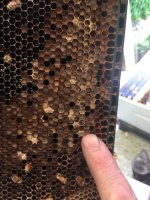For the first time ever (6 years) I have chalkbrood.
Bad in one hive.
Some evident in 2 others.
I have removed a large amount of bad frames and added adult bees.
I am checking weekly and clearing bottom board. Positioning hives as best as I can to prevent drifting.
I gather requeening will help,but can't quite understand how I can get rid of this,if I have infected bees?
Also,I had a hive die out in winter and some of the frames were moldy. Did this contribute to my bees getting this disease.
My site is dry and hives are usually good.
Any advise is welcome.
Bad in one hive.
Some evident in 2 others.
I have removed a large amount of bad frames and added adult bees.
I am checking weekly and clearing bottom board. Positioning hives as best as I can to prevent drifting.
I gather requeening will help,but can't quite understand how I can get rid of this,if I have infected bees?
Also,I had a hive die out in winter and some of the frames were moldy. Did this contribute to my bees getting this disease.
My site is dry and hives are usually good.
Any advise is welcome.



